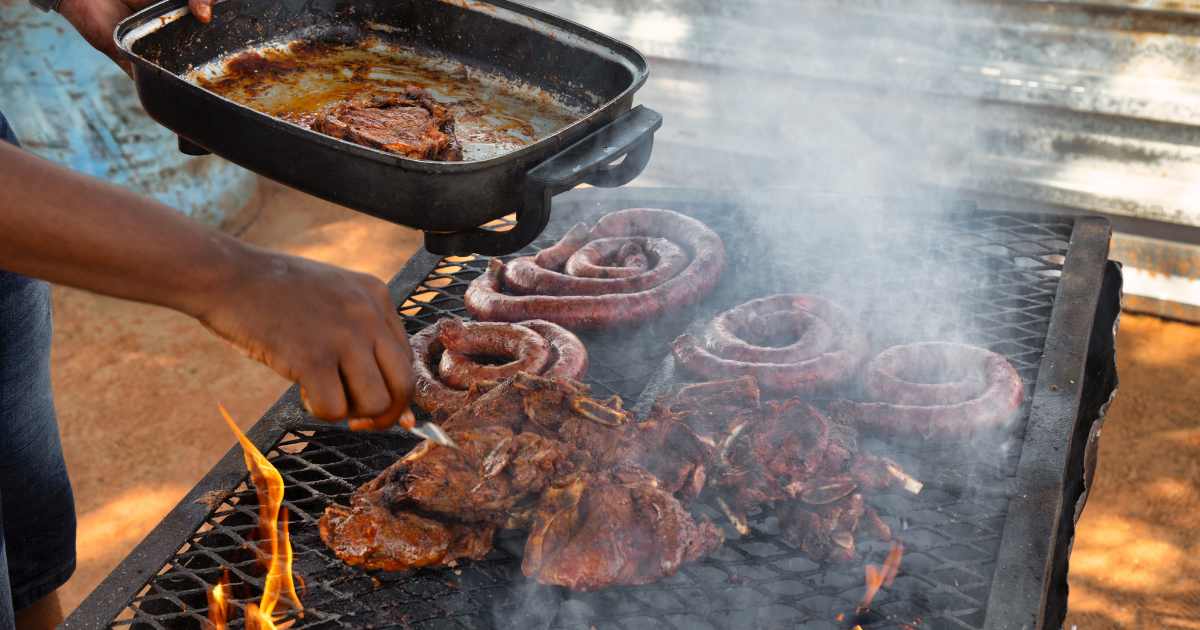
Shisanyama businesses are some of the most successful businesses in South Africa. When you think of shisanyama establishments such as Max’s Lifestyle, Rands in Cape Town, and The Hang Awt have grown into big businesses because of their dedication to the shisanyama ‘lifestyle’.
These businesses are growing exponentially using the same business model, so the question is: Why do shisanyamas work?
‘Shisa nyama’ is a Zulu saying which means to ‘burn meat’. In other countries, they refer to it as barbecued meat.
The buy and braai business ties into the well-known practice of ‘braai’ which is a staple tradition in every South African home. Because South Africans love their braai meat so much, shisanyama businesses are popping up everywhere and are growing successfully.
If you’re looking to open your own shisanyama business or buy and braai, consider this article the market research you need before going ahead with your plan.
What Makes Up a Shisanyama Business?
Besides the obvious delicious meat, there are other elements which make a shisanyama. One of the other things these businesses provide is convenience. Most people who live in the suburbs don’t have access to authentic shisanyama food and travelling is not always an option.
Additionally, shisanyama businesses also provide a space where people can enjoy good food, music, the company of loved ones and (occasionally) alcohol.
The most important part of a shisanyama business is the food offering. Meat is the standard food item, and the most popular meats include beef steak, chicken, boerewors, pap (cooked maize meal) and typically a relish called chakalaka.
These days shisanyamas also offer foods such as ribs, fish, grilled corn, potato salad, green (or Greek) salad and prawns. These items are added because of a growing interest from the public. This showcases another reason why these businesses are so successful; they understand how to notice the wants and needs of their customers and align according to that.
Opportunities and Challenges
Like with any other business and industry, the buy and braai business has its own ups and downs. Let’s look at some of the challenges that exist in the shisanyama industry.
Challenges
One of the biggest challenges for these businesses is logistics. Because most of these businesses are based in the townships, they serve people who are close to them. And as good as that is, once your business has more to offer, you need to expand to other locations.
This is not always possible for township-based businesses because delivery platforms don’t always take their restaurants onto their platforms due to safety issues.
Another common challenge is the ever-lasting load shedding. Load shedding has affected all businesses in many ways but for shisanyama businesses, it means that customers cannot come to them. Although a lot of these businesses use fire as their cooking instrument, they need electricity to store ingredients, keep fridges and stoves on and to serve customers during the night.
Lastly, most of these businesses start out as informal but never leave that category because of the bureaucratic processes. They have to apply for food permits and licences, register with the South African Revenue Services (SARS) and the Companies and Intellectual Property Commission (CIPC).
Although these things are required by law, getting approval for them is not always easy. They require a lot of documentation (financial statements, management accounts, application forms etc) and they need money.
These challenges make it hard for shisanyama businesses to grow and turn into enterprises that not only provide delicious food for people but also ones that employ a lot of people and help the economy.
As many challenges as there are, there are also a multitude of opportunities within the shisanyama businesses.
Opportunities
The best thing about having a shisanyama is that you can start in your own backyard. You don’t need a big fancy location to have the most basic shisanyama business. However, once you want to expand you might have to look at a bigger location or get permits to continue hosting it at home.
Another opportunity that comes with shisanyama business is that chances for expansion are many. You can take it from just a food business to serving alcohol, adding chairs for people to come and sit (think restaurant), maybe even introduce a car wash option (like most do) and you can add your own delivery service.
You can also offer to give customers ‘braai’ classes and teach them how to make delicious food like you. This is not only a unique idea that many other shisanyama businesses don’t offer but it also creates an additional source of income for you.
You can also turn your shisanyama into a franchise. Because of its growing popularity, more people are looking to own a shisanyama business but starting from scratch is not an option. You can franchise your existing business and basically expand to different locations without lifting a finger.
Lastly, shisanyama businesses are a combination of traditional aspects with modern business practices. Because of the traditional aspect, they are a popular tourist destination. When people visit South Africa, they will want to taste a traditional shisanyama. You can partner with a tourism company, and they will bring you potential customers who will pay to eat your food.
These opportunities only touch on the surface of how great a shisanyama business is. The minute you start your business there will be challenges but the rewards of your hard work will be many.
Remember, if you want to open a shisanyama business and need funding got it, there are government funding options for you like the Township and Rural Entrepreneurship Programme. Apply for funding today and get your shisanyama business off the ground!






